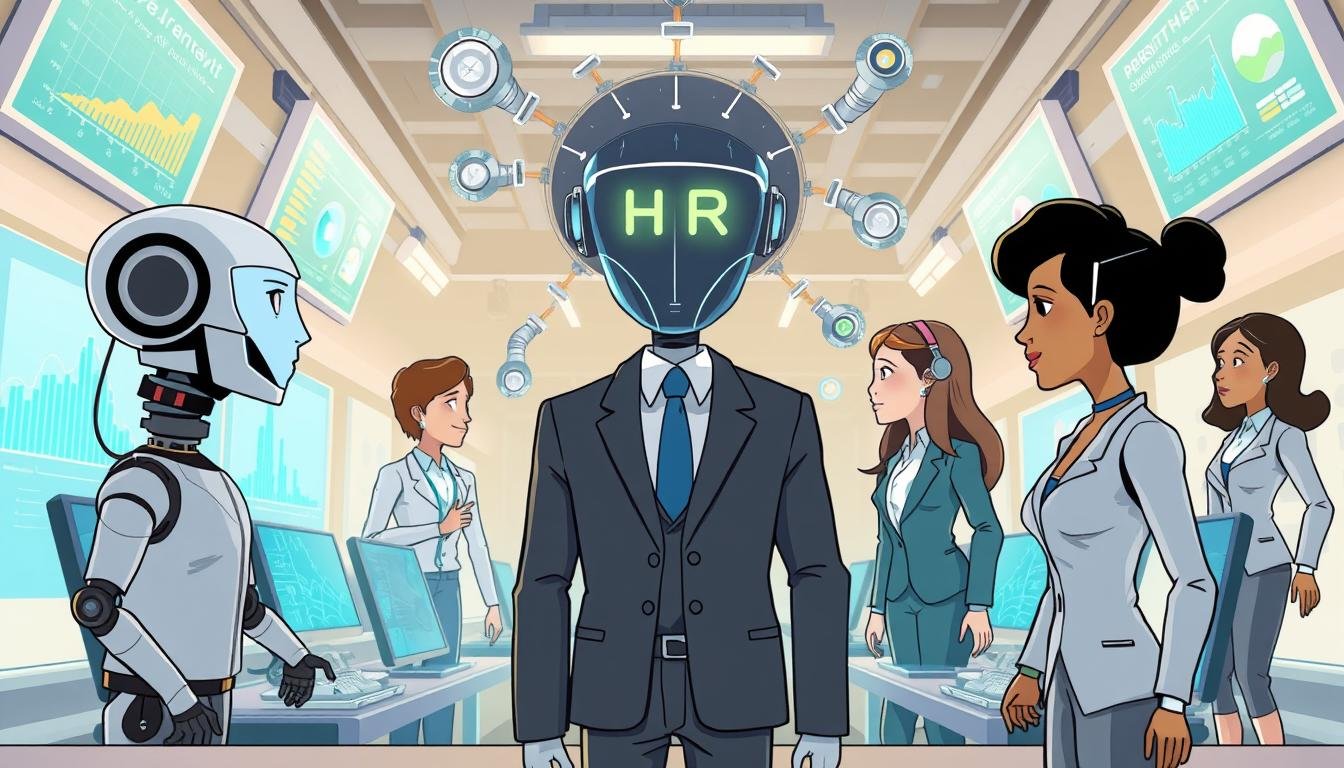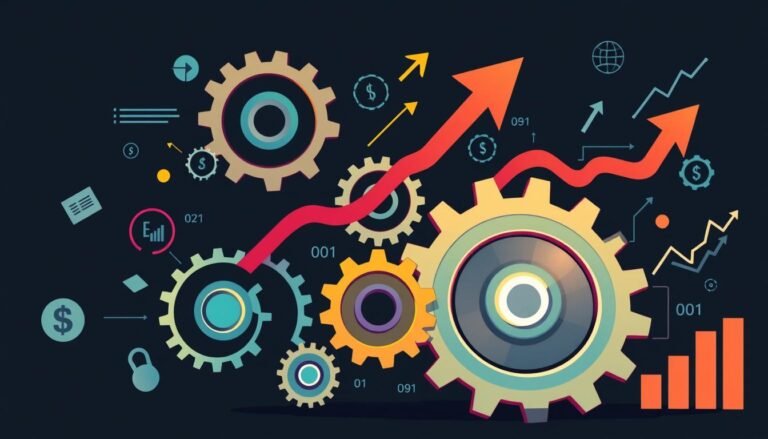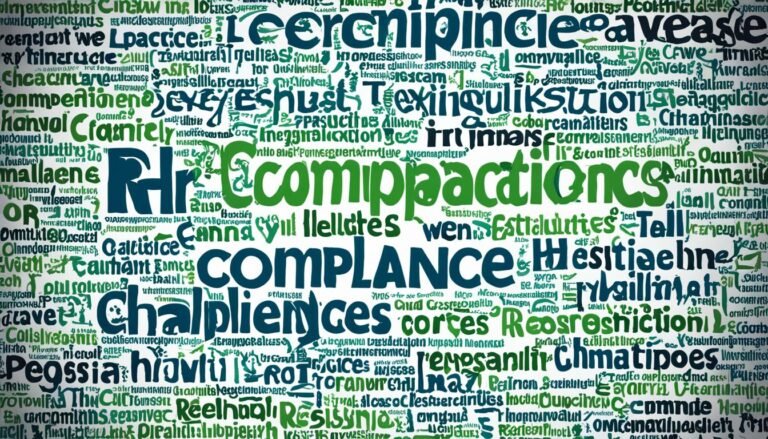Generative AI and Its Impact on HR Practices
The HR world is buzzing with excitement over Generative AI. This game-changing technology is reshaping how companies handle their people processes. From recruitment to retention, AI is making waves in every corner of HR.
Generative AI is more than just a fancy tool. It’s a powerful ally for HR teams looking to work smarter, not harder. By automating routine tasks, AI frees up HR pros to focus on what really matters: people.
AI-Powered Recruitment is changing how companies find top talent. These smart systems can sift through mountains of resumes in no time, spotting the perfect candidates faster than ever. But it’s not just about speed – AI helps reduce bias too, making hiring fairer for everyone.
AI-Driven Talent Acquisition goes beyond just finding new hires. It helps predict which candidates will stick around and thrive in your company culture. This means better matches and happier employees in the long run.
Despite its potential, many companies are still on the fence about AI. A whopping 65% of HR departments haven’t even talked to their bosses about using AI. And 70% of organizations don’t really get what AI can do for them. It’s time for HR to step up and lead the AI revolution!
Key Takeaways
- Generative AI streamlines HR processes, boosting efficiency
- AI-Powered Recruitment reduces bias and speeds up hiring
- AI-Driven Talent Acquisition improves candidate matching
- 76% of HR leaders see AI adoption as crucial for success
- Many companies still lack understanding of AI’s potential in HR
- HR teams can lead digital transformation with AI adoption
Introduction to Generative AI in the Workplace
Generative AI is changing HR, bringing new ways to engage employees and analyze data. It can create content, analyze data, and even write code. This is changing how HR works.
What is Generative AI?
Generative AI uses smart algorithms to make new content. It’s part of AI that includes big language models like ChatGPT and BERT. These tools can write, design, and analyze, helping in many HR areas.
Key Components of Generative AI
Generative AI has neural networks, natural language processing, and machine learning. These parts work together to handle lots of data and make outputs that seem human.
| Component | Function |
|---|---|
| Neural Networks | Process and learn from large datasets |
| Natural Language Processing | Understand and generate human language |
| Machine Learning Algorithms | Improve performance through experience |
Benefits of Generative AI in HR
Generative AI helps HR a lot. It makes work more efficient, offers personalized services, and helps make better decisions. With AI-Assisted HR Analytics, companies can understand their workforce better.
- Automates repetitive tasks, freeing up time for strategic work
- Provides personalized career development paths
- Enhances recruitment processes with AI-powered screening
- Improves employee training with tailored content recommendations
As Generative AI gets better, it will have a bigger impact on HR. It will bring new chances for better employee engagement and more efficient HR work.
Transforming Recruitment Processes
AI is changing how we hire. It makes the process faster and more efficient. Let’s see how AI is helping HR professionals.
AI-Powered Resume Screening
AI now helps screen resumes. It quickly finds the right skills for the job. This saves time and finds the best candidates.
Chatbots for Candidate Engagement
AI chatbots are changing how we talk to job seekers. They answer questions and schedule interviews. This makes the hiring process better and frees up HR staff.
Enhancing Job Descriptions with AI
AI tools help write better job posts. They suggest skills and improve the language. This attracts more qualified candidates and increases diversity.
| AI Recruitment Feature | Benefit | Impact |
|---|---|---|
| Resume Screening | Faster candidate selection | 81% of HR leaders considering or using AI |
| Chatbots | Improved candidate experience | 24/7 engagement and quick responses |
| Job Description Enhancement | Better quality applicants | Increased diversity in applicant pool |
AI in HR is not just a trend; it’s essential. By using these tools, companies can find the right talent efficiently. This makes the hiring process better for everyone.
Generative AI and Employee Onboarding
AI is changing how we welcome new employees. Over two-thirds of US companies now use AI in their onboarding. This new approach is making the process smoother and more effective.
Personalized Onboarding Experiences
AI makes onboarding personal by using data from chats, surveys, and social media. This makes new employees feel more connected and happy in their jobs. AI helps predict what new hires need, making it easier for them to fit in.
Automating Administrative Tasks
Generative AI makes HR work 30% faster. It handles paperwork, sends messages, and tracks onboarding trends. This lets HR teams focus on more important tasks and caring for employees.
Virtual Reality in Training
Virtual reality training is more effective than old methods. It lets people explore and learn in a virtual workplace. This improves how well they remember what they learn.
| AI Onboarding Feature | Benefit |
|---|---|
| Personalized Learning Pathways | Increased Engagement |
| Automated Administrative Tasks | Improved Efficiency |
| Virtual Reality Training | Enhanced Information Retention |
| AI-Facilitated Diversity and Inclusion | Better Company Culture |
Using AI in onboarding makes the experience better for new employees. It makes the process more engaging, efficient, and inclusive. This technology also helps create a more welcoming workplace for everyone.
Performance Management Innovations
Generative AI is changing how we manage performance in HR. It brings new ways to check and improve how employees do their jobs. This makes the process more lively and effective.
Continuous Feedback Systems
AI tools offer feedback right when it’s needed, not just once a year. This means employees can adjust and meet goals faster. For example, Betterworks helps with setting goals and getting feedback from peers. It’s a personal way to help employees grow.
AI-Driven Performance Analysis
Generative AI looks at lots of data to spot trends and patterns. This helps HR make smart choices about who to develop and how to improve the company. Google’s Project Oxygen found what made top managers great by looking at the data.
Customizing Development Plans
AI helps make plans that fit each person’s skills and goals. This makes learning and growing at work more effective for everyone.
| AI Feature | Benefit | Impact |
|---|---|---|
| Real-time feedback | Timely adjustments | Improved alignment with goals |
| Data analysis | Identify performance trends | Informed decision-making |
| Personalized planning | Tailored development | Enhanced employee growth |
Using Generative AI in performance management makes work better for everyone. It makes the workplace more engaging, fair, and productive. This approach helps improve processes and boosts employee happiness and growth.
From Employee Engagement to Retention
In today’s fast-changing work world, AI is changing how companies keep their employees. Only 32% of US workers are fully engaged. HR teams are now using new ways to tackle issues like the Great Resignation and “quiet quitting.”
Measuring Employee Sentiment with AI
AI tools look at surveys and how people interact at work. They give deep insights into what employees really feel. This helps HR teams find out what needs to get better and how to make things better.
Tailoring Benefits and Rewards
Generative AI makes benefits programs that fit what each person wants. It looks at what employees need and how they act. This way, companies can give rewards that really matter to their workers, making them happier and more loyal.
Predictive Analytics for Turnover Prevention
AI doesn’t just help with hiring. It can predict when people might leave, so HR can act early. This is key, as 66% of HR teams focus on keeping employees.
| AI Impact on HR | Percentage |
|---|---|
| HR leaders planning to use generative AI | 72% |
| HR professionals expecting AI to boost productivity | 84% |
| HR leaders already using generative AI | 25% |
By using AI, companies can make work better for everyone. This leads to more engagement and keeping employees. As AI gets better, it will play an even bigger part in keeping employees happy and on board.
Generative AI for Talent Development
AI is changing how companies grow their talent. It offers new ways to improve skills, making sure each employee gets the right chance to grow.
Identifying Skills Gaps
AI tools look at the skills of the workforce to find what’s missing. They compare what employees can do with what jobs need. This helps focus training on what’s most important for the company.
Custom Learning Pathways
Generative AI makes learning plans that fit each person’s needs and dreams. It changes the content to match each employee’s unique path. This makes learning more fun and keeps people on the team longer, with 94% saying they’d stay if they had more chances to grow.
AI Mentorship Programs
AI helps set up mentorship programs that give ongoing support. It matches mentors and mentees based on their skills and goals. These programs give feedback right away, helping employees get better and keeping learning going.
| AI-Powered Employee Development Feature | Benefit |
|---|---|
| Skills Gap Analysis | Targeted training initiatives |
| Personalized Learning Paths | Increased engagement and retention |
| AI Mentorship | Continuous professional growth |
Using AI for talent development helps companies build a strong, adaptable team. It boosts individual growth and helps the company succeed in a changing world.
Diversity and Inclusion Efforts
AI is changing how companies work on equality in the workplace. It uses AI-Assisted HR Analytics to help make workplaces more inclusive.
Reducing Bias in Hiring
AI tools are key in reducing bias in hiring. A study found that candidates with “White sounding” names were 50% more likely to get an interview. AI can hide identity markers, making it fair for all applicants.
Monitoring Diversity Metrics
AI helps analyze HR data in real-time. For example, it can show if a company’s diversity matches the US population’s. Currently, 13.6% of the US is Black.
| AI Application | Impact on Diversity |
|---|---|
| Name Masking | 50% reduction in name-based bias |
| Data Analysis | Real-time tracking of diversity metrics |
| Language Analysis | Flagging biased language in communications |
Enhancing Inclusive Culture with AI
AI is making inclusivity efforts better. It powers virtual reality DEI training and AI translation tools. Companies like Sanofi use AI to make websites accessible, promoting digital inclusion.
As AI gets better, it will play a bigger role in diversity and inclusion. With 51% of employees expecting AI to improve work, its use in DEI is promising a fairer future.
Legal and Ethical Considerations
AI-Assisted HR Compliance is becoming more common, but it brings new challenges. The EU AI Act divides AI systems into four risk levels. This helps companies use AI in HR responsibly.
Data Privacy Challenges
Keeping employee data safe is key when using AI in HR. Companies need strong security and high-quality data to avoid errors and biases. The EU AI Act’s rules for high-risk AI systems will start in summer 2027. This shows the importance of being ready.
Transparency in AI Decision-Making
Trust in AI systems grows when employees understand how they work. HR should explain AI-driven decisions, especially in important cases like hiring. Being open is essential for fairness and trust in AI tools.
Building Ethical AI Frameworks
Companies should make an ethics charter for using AI in HR. This includes checking for bias, respecting privacy, and having human oversight. By creating strong ethical frameworks, companies can use AI safely and effectively.
Research by Insight222 shows top companies focus on ethical AI use in HR. HR leaders need to keep up with new rules and best practices. With 76% of HR leaders concerned about falling behind without AI, finding a balance is key for success.
The Future of Generative AI in HR
Generative AI is changing HR, bringing new ways to manage the workforce. The future of human resources looks very different.
Emerging Trends and Technologies
AI-Enabled Workforce Planning is becoming more popular. By June 2024, 58% of employers plan to use Generative AI in HR. This tech will make HR work more efficient for 76% of companies.
Predicting Future Use Cases
Generative AI will change HR roles. For example, Learning and Development specialists might spend less time designing programs. They could save 14% of their time.
Total Rewards leaders might see their workload drop by 52%. This could give them more time for big projects.
| HR Role | Current Time Spent | Projected AI Impact |
|---|---|---|
| Talent Management | 55% on program delivery | Significant reduction expected |
| L&D Specialist | 35% on program design | Reduced to 21% |
| Total Rewards Leader | Variable | 52% of workload affected |
The Evolving Role of HR Professionals
HR pros will focus on big ideas as AI handles routine tasks. This change shows HR is more than just paperwork. It’s about making smart choices and improving work life.
Overcoming Challenges in Implementing AI
Using AI in HR comes with its own set of challenges. Many companies struggle to adopt these new tools. Let’s look at the main problems and how to solve them.
Resistance to Change within Organizations
Change can be hard to accept. In HR, some employees fear AI will take their jobs. Leaders need to show how AI makes their work better, not worse.
It’s important to explain how AI-Assisted HR Analytics can make their jobs easier. This can help change their minds.
Integrating AI with Existing Systems
Adding AI to current HR systems is a challenge. It needs careful planning and execution. Start small, like using AI for resume screening.
Then, move on to more complex tasks. Working with AI experts ensures a smooth integration.
Addressing Skill Gaps Among HR Staff
Many HR staff lack the skills for AI. Training is essential to fill this gap. Companies should invest in programs that teach AI literacy and data analysis.
“76% of HR leaders plan to implement AI technology within 12-18 months to stay competitive.”
Despite the hurdles, AI in HR offers many benefits. With the right approach, companies can overcome these challenges. This leads to more efficient HR processes that help the business grow.
Conclusion: Embracing Generative AI in HR
Generative AI is changing HR practices fast. 75% of talent leaders see its value. It’s making recruitment and employee engagement better. The AI market in HR is expected to grow a lot, reaching $2091.4 million by 2032.
Key Takeaways
Generative AI is making a big difference in HR. It’s making hiring easier and making work better for employees. TechCorp saw a 20% boost in keeping new hires. AlphaBank’s training got 35% better with AI.
Roadmap for Future Success
Looking ahead, AI will be key in HR. Companies should start using AI tools slowly. Focus on hiring, welcoming new employees, and managing performance. Training HR staff to work with AI is also important.
Encouraging Open Dialogue on AI Nutzung
AI has many benefits, but we must talk about its downsides. Like bias and jobs lost. Regular checks and careful use can help. AI is meant to help, not replace, HR workers. Talking openly about AI helps build trust and ensures it’s used right.
Source Links
- The Impact of Generative AI on HR | Outsourced HR Advice UK
- Generative AI is revolutionising HR practices – HRD
- The Role Of Generative AI In HR
- The Role Of Generative AI In HR Is Now Becoming Clear
- Generative AI and the future of HR
- Part One: Introduction to Generative AI and its Potential in the Workplace
- How are AI and Generative AI transforming Human Resources? | 365Talents
- The Impact of Generative AI on Recruitment: Revolutionizing the Hiring Process
- AI-Enhanced Employee Onboarding: A New Era In HR Practices
- How Will Generative AI Transform HR as We Know It?
- How Data And AI Are Reshaping Contemporary HR Practices
- Generative AI as a catalyst for HRM practices: mediating effects of trust – Humanities and Social Sciences Communications
- How Generative AI Is Transforming HR And Performance Reviews – Spiceworks
- The Future of HR: AI’s Impact on Employee Engagement
- AI and HR: Building Engagement, Retention, and Performance
- Generative AI in HR: Examples & How To Successfully Start Using AI
- What HR Needs to Know About Generative AI
- Generative AI: Exploring Possibilities for Talent Management
- AI Implications for Diversity, Equity and Inclusion (DEI)
- AI and DEI
- Ethical Considerations in Using AI for HR | myHRfuture
- AI Ethics: Implications for Human Resource Leaders
- The Rise of Generative AI in HR: Transforming the Future of Work
- Generative AI will transform three key HR roles
- Unlock HR Innovation: AI’s Impact, Challenges & Solutions
- A Step-by-Step Guide to Overcoming AI Challenges in HR
- Using AI in HR: The Impact, Hurdles & Actions HR Leaders Must Take
- Here’s How Generative AI is Transforming Human Resources
- Embracing Generative AI in Human Resources
- Embracing Generative AI: The Future of HR in 2024








